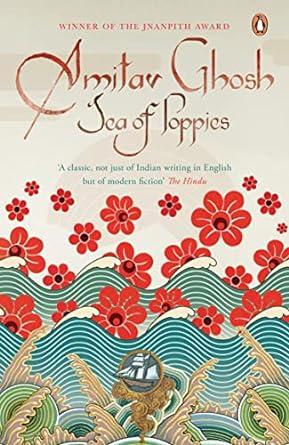
Book Blurb: At the heart of this vibrant saga is a vast ship, the Ibis. Her destiny is a tumultuous voyage across the Indian Ocean shortly before the outbreak of the Opium Wars in China. In a time of colonial upheaval, fate has thrown together a diverse cast of Indians and Westerners on board, from a bankrupt raja to a widowed tribeswoman, from a mulatto American freedman to a free-spirited French orphan. As their old family ties are washed away, they, like their historical counterparts, come to view themselves as jahaj-bhais, or ship-brothers. The vast sweep of this historical adventure spans the lush poppy fields of the Ganges, the rolling high seas, and the exotic backstreets of Canton.
As the blurb reads, this is a book of naval adventure like no other. A diverse set of individuals, each with their own back stories and unique set of circumstances find themselves on a voyage from Kolkata to Port Louis, Mauritius on the Ibis, and while the voyage itself is only around 1/3rd of the book, the first 2/3rds of the book is used in setting up individual stories of each of these individuals and their journeys and stories of how they end up on the Ibis.
This book and in fact, the entire Ibis trilogy has been on my to-read list ever since I had read "The Glass Palace" by the same author and it took me the better part of a decade to get around to reading this book. And to be honest, the wait was well worth it. While the author is known for his use of impeccable English in penning down the wonderful stories he tells, his usage of the local naval pidgin language in this book whenever relevant characters have to use it is wonderful and adds a lot to readers being able to visualize life on board the Ibis. And the author takes it a step further with his usage of how the British combined the local Indian words and English terms to describe more than quite a few things in colonial India. Some examples ... More-Roger (maharaja), Padshaw (Badshah) and so on. These terms add to the fun of the reader trying to interpret what is actually being talked about in the book.
Another thing that I realized when I finished the book is that it seems to deal with pairs of characters rather than individuals themselves. While each of the individual characters are fleshed out quite well, it is the equations between pairs of characters that drive the story forward. Deeti and Kalua, Zachary and Serang Ali, Zachary and Paulette, Putli and Jodu, Neel and Ah Fatt .... the list of pairs go on. The pain that the author has taken with regard to the world building while ensuring that each character has a life of his/her own is what makes this book compelling reading.
I personally cannot wait to get my hands on the second book of this trilogy given that the first one ends with the proverbial cliffhanger.
